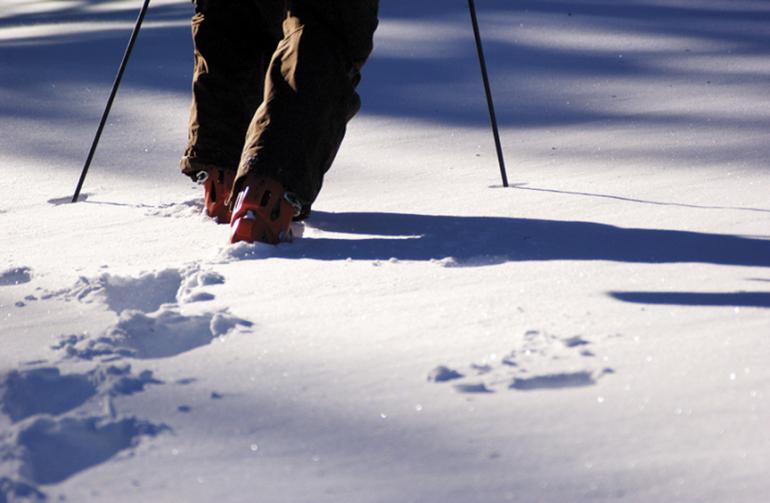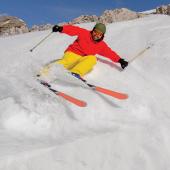Shin Guard
How to fix boot bang.
Once the ski season gets rolling, I often see skiers and snowboarders (referred to collectively as “skiers” from here on out) complain about pain in their anterior shins. It’s called “shin bang,” or sometimes “boot bang”: a condition where the shin pushes or hits against the boot every time you flex forward, causing a painful bruise.
There are a few common causes of boot bang: first and most common is wearing boots that are too big. In this case, your foot and ankle can slide forward and backward, causing contact between the shin and the tongue of the boot. Another is backseat skiing—poor form that results in the shin pulling away from the boot and then banging into the tongue. Wearing boots that are too stiff can often cause backseat skiing. If your boots aren’t flexible enough, you won’t be able to sit far enough forward on your skis, effectively forcing you into the backseat. Finally, skiing too aggressively or with limited visibility over jumps and moguls can cause serious stress to your lower legs, especially if you land in the backseat.
Like most injuries, there are many purported remedies, but none as effective as simply resting. Don’t confuse prevention with a cure; for instance, wearing thick socks can be effective in prevention, but won’t improve the condition once you have it, just as tightening your boots can help initially, but can exacerbate the shin bang if you have it already. To stop shin bang before it happens, some skiers swear by shin guards, and some wear their power straps inside the plastic of the boot to stop excessive movement. You can also try calf raises or toe lifts to build the muscle around your shin to create cushioning.
Once your shins become bruised, they will often hurt for a week or two—and although taking nonsteriodal anti-inflammatories (such as ibuprofen) can be help you ski through the discomfort, once this condition starts, it is unlikely to resolve without taking a break from the slopes. Specially designed or fitted ski boots are commonly recommended, but rest is ultimately the most effective remedy. If you start to get a bruise, ice it every night, avoid the painful activity, and consider modifying your boot.
Jon Robinson, M.D. is an orthopedic surgeon at Bridger Orthopedic (bridgerorthopedic.com) in Bozeman. He specializes in foot and ankle disorders.












